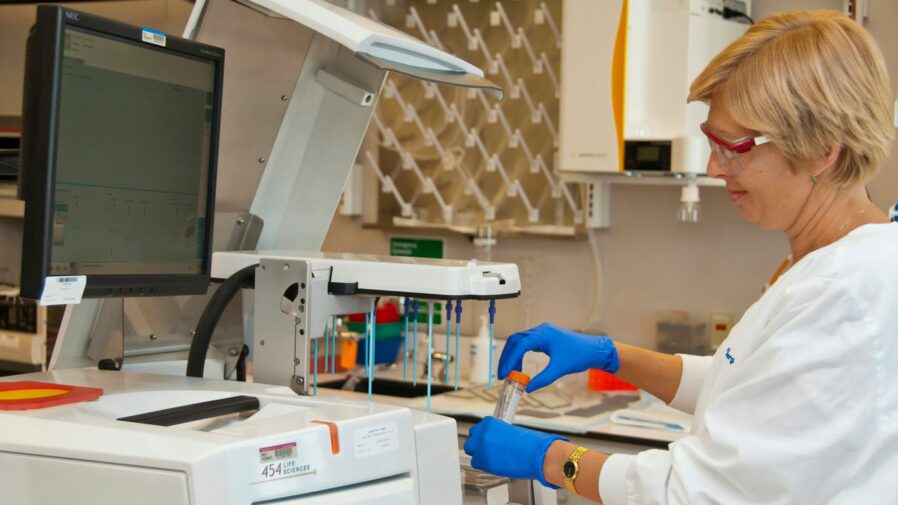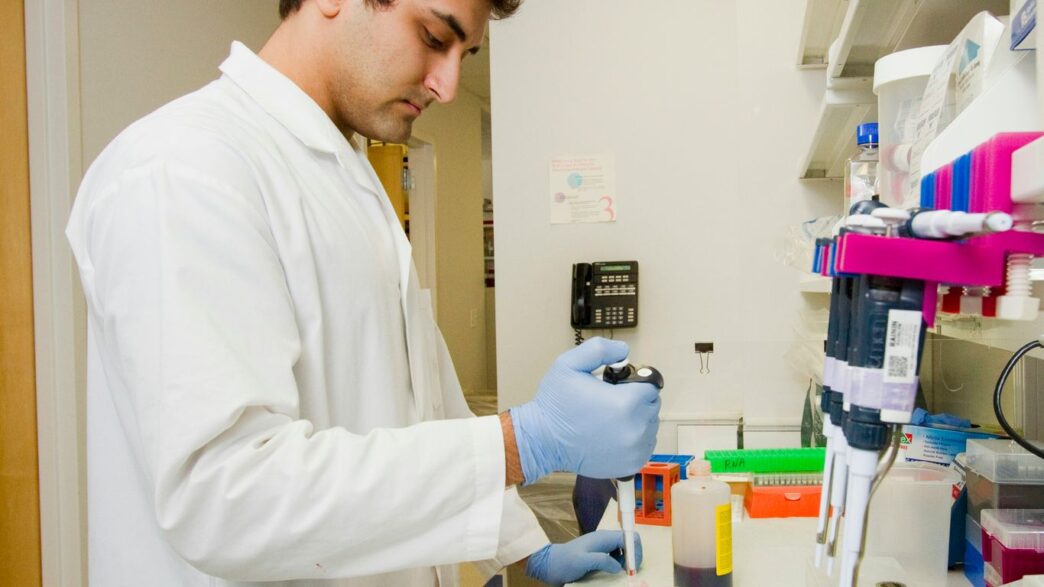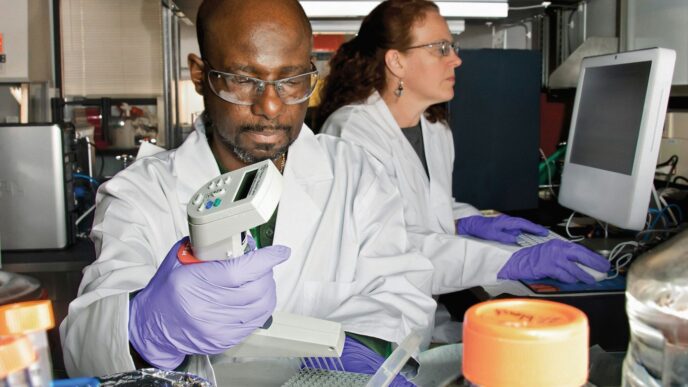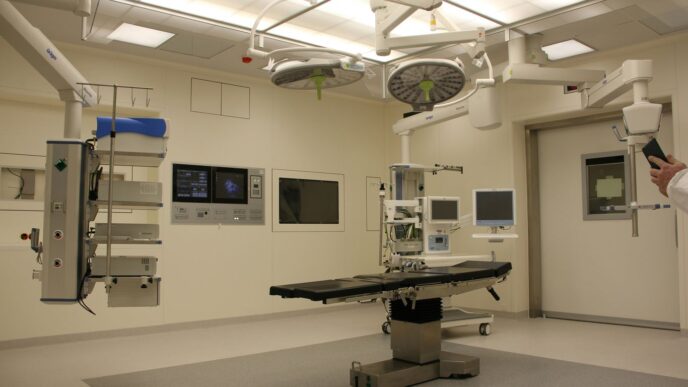Canada has a strong history in medical discoveries, like insulin and treatments for HIV/AIDS. Today, around 2,000 companies work in life sciences across the country. While we’re good at creating new ideas, Canada faces challenges in turning these into big businesses, shown by a growing trade deficit in pharmaceuticals. This article looks at some of the top canadian biotech companies and what’s happening in the sector, especially in Ontario. We’ll explore how these companies are using new tech like AI and what makes certain regions, like Brampton, important for health innovation.
Key Takeaways
- Companies like Cyclica and Deep Genomics are using AI to speed up how we find new drugs and treatments for genetic diseases.
- Microbix Biosystems and OmniaBio are important players in making tools for medical tests and scaling up cell and gene therapies.
- Canadian universities, such as the University of Toronto and McMaster, play a big part in research and clinical trials that help biotech grow.
- Trends like gene editing (CRISPR), personalized medicine, and better ways to make biological products are shaping the future of biotech.
- Ontario is a major center for canadian biotech companies, with strong support systems, investment, and a lot of skilled people.
Pioneering Canadian Biotech Companies Leveraging AI and Machine Learning
Canada’s biotech scene is really stepping up, especially when it comes to using artificial intelligence and machine learning. These technologies are changing how we find new medicines and treatments. It’s not just about faster processes; it’s about smarter, more targeted approaches to health.
Cyclica: Accelerating Drug Discovery with AI
Cyclica is a great example of this. They use AI to speed up the process of finding new drugs. Their system looks at how potential drugs might interact with proteins in the body. This helps researchers figure out which drug candidates are most likely to work, and which ones to skip, saving a lot of time and resources. In fact, their work was so impactful that Cyclica was acquired by Recursion in 2023, merging their platforms to push forward discoveries in computational biology.
Deep Genomics: AI-Driven RNA Biology and Genetic Therapies
Then there’s Deep Genomics. They’re using AI to understand RNA biology and genetic changes. Think about it: they’re building therapies that can fix problems caused by genetic mutations. This is a big step for personalized medicine, making treatments more specific to an individual’s genetic makeup. Their AI approach is really helping to pinpoint how to tackle genetic diseases.
ProteinQure: Computational Approaches to Novel Therapeutics
ProteinQure is another company making waves. They’re using computer models and machine learning to design new drugs, particularly those based on proteins. Their focus is on areas like cancer and rare diseases. By combining biology, chemistry, and AI, they’re working to create treatments that were previously hard to imagine. This integration of different scientific fields is key to their innovative drug design.
Innovations in Biomanufacturing and Diagnostics
Biotech is really changing how we handle health, and a big part of that is in making things and figuring out what’s wrong. It’s not just about new medicines anymore; it’s also about how we produce them and how we can spot diseases earlier and more accurately.
Microbix Biosystems: Essential Tools for Diagnostic Accuracy
Microbix Biosystems is a company that focuses on creating the building blocks for diagnostic tests. Think of them as the folks who make sure the tests you take actually work correctly. They produce things like quality control materials and the special media needed to keep samples safe, especially for viruses. Their work is super important for making sure diagnostic tests, like those used for COVID-19, are reliable. Without these kinds of products, it would be much harder to trust the results we get from medical tests.
OmniaBio: Scaling Cell and Gene Therapies
When we talk about cell and gene therapies, we’re talking about some pretty advanced treatments that can change how we fight diseases like cancer. But making these therapies is really complicated and expensive. That’s where OmniaBio comes in. They are one of Canada’s biggest places that helps other companies actually make these advanced treatments on a larger scale. They offer a full service, from the early stages of development right through to manufacturing. This helps get these potentially life-saving therapies from the lab to the patients who need them, faster.
Here’s a look at what they do:
- Development Support: Helping companies figure out the best way to produce their cell or gene therapy.
- Manufacturing: Actually producing the therapies in specialized facilities.
- Scaling Up: Increasing production so more patients can access the treatments.
- Quality Control: Making sure every batch meets strict standards.
The Role of Canadian Universities in Biotech Advancement

Canadian universities are really the bedrock for a lot of the biotech progress happening in the country. They’re not just places for students to learn; they’re active research hubs where new ideas are born and tested. Think of them as the starting line for many groundbreaking discoveries.
University of Toronto’s Legacy in Medical Breakthroughs
The University of Toronto has a long history of making big contributions to medicine. You know, they were involved in the discovery of insulin, which is pretty huge. This kind of history means they have a strong foundation for current research. They have advanced labs and good connections with companies, which helps new biotech businesses get off the ground. It’s like they’ve built a whole system for turning scientific ideas into real-world applications.
McMaster University’s Focus on Clinical Trials and Personalized Medicine
McMaster University, over in Hamilton, is really focused on medical research and, importantly, clinical trials. This is a big deal for biotech companies because it means they can access a large group of people for testing new treatments. McMaster’s approach, which emphasizes evidence-based medicine, is pushing innovation, especially in areas like personalized medicine and new ways to treat diseases using the body’s own systems. They’re helping to make treatments more tailored to individual patients.
Waterloo’s Ecosystem for Health Innovation
While not always the first place people think of for biotech, the University of Waterloo is building a strong reputation for health innovation. They’re creating an environment where different kinds of thinkers – scientists, engineers, computer experts – can work together. This collaborative atmosphere is key to tackling complex health problems. The university’s focus on creating an ecosystem where innovation can thrive is a model for how academic institutions can directly support the growth of the biotech sector. They’re helping to create the next generation of biotech leaders and technologies.
Key Trends Shaping the Canadian Biotech Landscape
The Canadian biotech scene is really buzzing right now, with a few big trends pushing things forward. It’s not just about new discoveries anymore; it’s about how we make those discoveries useful and accessible.
Gene Editing and CRISPR Technology
This is a huge one. Gene editing, especially with tools like CRISPR, is changing how we think about treating genetic diseases. Instead of just managing symptoms, we’re getting closer to fixing the root cause. Companies are looking at how to correct faulty genes for conditions like cystic fibrosis or sickle cell anemia. It’s still early days for many applications, but the potential is massive. Imagine a future where genetic disorders are corrected before they even cause problems. It’s like having a biological spell checker for DNA. This technology is also being explored for fighting cancer and diabetes, making it a really versatile tool in the biotech arsenal.
The Rise of Personalized Medicine
Gone are the days of one-size-fits-all treatments. Personalized medicine is all about tailoring therapies to an individual’s unique genetic makeup, lifestyle, and environment. This means treatments are more likely to work and have fewer side effects. Think about cancer treatments that are specifically designed for the type of tumor a patient has, or drugs that are dosed based on how a person metabolizes them. It’s a more precise and effective way to approach healthcare. This shift is really driven by advances in genetic sequencing and data analysis, allowing doctors and scientists to understand patients on a much deeper level. It’s a big step towards more effective patient care.
Advancements in Biomanufacturing Capacity
As more biotech discoveries move from the lab to the market, there’s a growing need for places that can actually produce these complex therapies at scale. Biomanufacturing is becoming increasingly important. This includes everything from producing vaccines and antibodies to manufacturing cell and gene therapies. Canada, and particularly Southern Ontario, is investing heavily in these facilities. Having strong biomanufacturing capabilities means that innovative treatments developed here can actually reach the patients who need them, both in Canada and around the world. It’s about building the infrastructure to support the next wave of medical breakthroughs, much like how new spacecraft are being developed for space travel [a4ee].
Here’s a quick look at some areas seeing major growth:
- Drug Discovery: Using AI to speed up the process of finding new medicines.
- Therapeutic Development: Creating new treatments for diseases like cancer and rare genetic conditions.
- Diagnostic Tools: Making better tests to accurately identify diseases.
- Scaling Production: Building the facilities to manufacture advanced therapies.
Ontario: A Hub for Canadian Biotech Innovation
Ontario’s Leading Position in Life Sciences
Ontario really is a powerhouse when it comes to Canadian biotech. It’s not just a claim; the numbers back it up. We’re talking about the biggest life sciences cluster in the whole country, and it even ranks pretty high up in North America. This isn’t accidental. A big part of it is how close Ontario is to major U.S. biotech centers like Boston and New York. That proximity makes it easier for local companies to connect with potential partners and find funding. Plus, the province has a solid history of supporting innovation through government policies and investments in research facilities and infrastructure.
Collaborative Ecosystems Driving Discovery
What makes Ontario so special is the way everyone works together. You have universities, research centers, hospitals, and companies, from small startups to big multinationals, all interacting. This creates a really dynamic environment where new ideas can take root and grow. Think about it: the discovery of insulin and stem cells happened here. That kind of history sets a tone. This collaboration means more groundbreaking discoveries, better clinical trials, and the ability to actually scale up new treatments and technologies. It’s a place where ideas can move from the lab to the market.
Investment and Talent in the Region
Let’s look at some figures that show just how active Ontario’s life sciences sector is:
- Number of Life Sciences Firms: Around 2,000 companies, which is 44% of all such firms in Canada.
- Life Sciences Workforce: Over 72,800 people were employed in this sector in 2022.
- R&D Investment: Ontario’s research hospitals invested about $1.82 billion in research and development.
- Global Pharma Presence: Ten of the world’s top pharmaceutical companies by revenue conduct clinical trials in Ontario.
This concentration of talent and investment creates a really fertile ground for biotech growth. It attracts more people, more money, and more companies, creating a positive cycle that keeps the innovation engine running.
Scaling Canadian Biotech Companies for Global Impact
It’s one thing to have a great idea in a lab, but getting that idea out into the world, to the people who need it, that’s the real challenge. For Canadian biotech firms, moving from a promising discovery to a globally recognized product involves a few key steps. We’ve seen some really interesting examples of companies that started here and are now making waves internationally.
Lessons from Successful Exits and Acquisitions
Sometimes, the best way for a Canadian biotech company to reach a global audience is through being acquired by a larger, established player. Think about Fusion Pharmaceuticals, a company focused on radiopharmaceuticals based in Hamilton. They were bought by AstraZeneca, a huge name in the industry. The good news is that even though it’s not Canadian-owned anymore, the work and the people are still based in Hamilton. This means the local expertise and infrastructure stay put, which is a win for the Canadian biotech scene. It shows that even if ownership changes, the impact can remain local while the reach becomes global.
Building Sustainable Biotech Ecosystems
Creating a strong, self-sustaining environment for biotech is super important. It’s not just about one company; it’s about the whole network. British Columbia, for instance, has built a really mature ecosystem. People move between companies, sharing knowledge and experience. This creates a kind of snowball effect, where talent and capital naturally flow, leading to more new companies. It’s like a self-feeding cycle of innovation. For this to happen, you need a few things:
- Government Support: Policies that look beyond immediate results and support long-term growth are vital. This includes funding for research infrastructure and programs that help companies grow.
- Talent Pool: Universities and research institutions need to work closely with industry to train people with the right skills. Keeping that talent here in Canada is key.
- Investment: Access to capital, especially for early-stage companies that might take over a decade to see a return, is critical. This can come from venture capital, government grants, and even successful exits.
The Importance of Early-Stage Investment
Getting a biotech company off the ground is incredibly expensive and takes a long time. We’re talking about hundreds of millions of dollars and often more than ten years before a product might hit the market. Because of this long timeline, it can be tough for policymakers to see the value in supporting these ventures. That’s where early-stage investment comes in. It’s the fuel that keeps these innovative companies running when they’re still just ideas. Without it, many potentially life-saving treatments might never get past the initial research phase. It’s a big gamble, sure, but the potential payoff for global health is enormous.
Brampton’s Growing Contribution to Global Health Solutions
Brampton Innovation District’s Focus
While Toronto and other parts of Southern Ontario often get the spotlight, Brampton is quietly building its own reputation in the biotech world. The Brampton Innovation District is becoming a real center for companies working on health and biotech. It’s attracting new businesses and people with good ideas, aiming to solve big health problems we see everywhere.
Medtronic Canada’s Impact
Medtronic Canada has a significant presence in Brampton. As a major player in medical devices globally, their work touches many areas of health. Think about managing diabetes, heart conditions, or even issues with the nervous system. Medtronic’s operations in Brampton contribute to developing solutions that help people worldwide.
Attracting Talent and Investment
Brampton’s location and its developing biotech scene are drawing in both skilled workers and money for new projects. This helps the city grow as a place for health innovation. The city is working to create an environment where startups can get started and grow, contributing to better health outcomes on a larger scale.
Looking Ahead
So, we’ve seen how Canada, especially Southern Ontario, is really stepping up in the biotech world. Companies are using smart tech like AI to find new medicines faster, and there’s a big push for treatments that are just for you, based on your own body. Plus, making these treatments is getting a boost with new facilities. It’s clear that the groundwork is being laid for Canada to not just keep up, but to really lead in creating the next wave of health breakthroughs. It’s an exciting time to watch this field grow and see what these innovative companies do next.
Frequently Asked Questions
What is biotechnology and why is it important in Canada?
Biotechnology is like using living things, such as tiny cells or parts of them, to make new medicines or find better ways to help people stay healthy. Canada is really good at this! Companies here use smart computer programs, like artificial intelligence (AI), to discover new drugs faster and create special treatments for diseases. Canada has a history of making big medical discoveries, like insulin, and continues to be a leader in this field.
How is AI helping Canadian biotech companies?
Think of AI as a super-smart helper for scientists. In Canadian biotech, AI is used to speed up the process of finding new medicines. It can look at lots of information very quickly to guess which drugs might work best for certain sicknesses or how they might affect the body. This helps companies like Cyclica and Deep Genomics create treatments much faster than before.
What are cell and gene therapies?
Cell and gene therapies are like fixing problems inside the body by using cells or the instructions (genes) that tell cells what to do. For example, scientists can take a person’s own cells, change them to fight cancer better, and then put them back into the body. Companies like OmniaBio are working to make these special treatments available to more people by figuring out how to make them in larger amounts.
Why is Ontario a major center for biotech in Canada?
Ontario is a big deal for biotech in Canada because it has many great universities that do important research, like the University of Toronto where insulin was first discovered. It also has lots of companies working together, creating a supportive environment for new ideas. Plus, many skilled people work in the life sciences there, and there’s a lot of money invested in new projects, making it a hub for medical progress.
What is personalized medicine?
Personalized medicine means creating treatments that are just right for you, based on your unique body, like your genes or how you live. Instead of giving everyone the same medicine for a disease, doctors and scientists try to figure out what will work best for each individual person. This makes treatments more effective and can lead to better health outcomes.
How do Canadian universities help the biotech industry?
Canadian universities are like the starting grounds for many biotech ideas. They have brilliant scientists and students who come up with new discoveries. Universities also work with companies to test out new ideas and help them grow. For instance, McMaster University is known for its work in clinical trials, which are important steps in testing new medicines.














